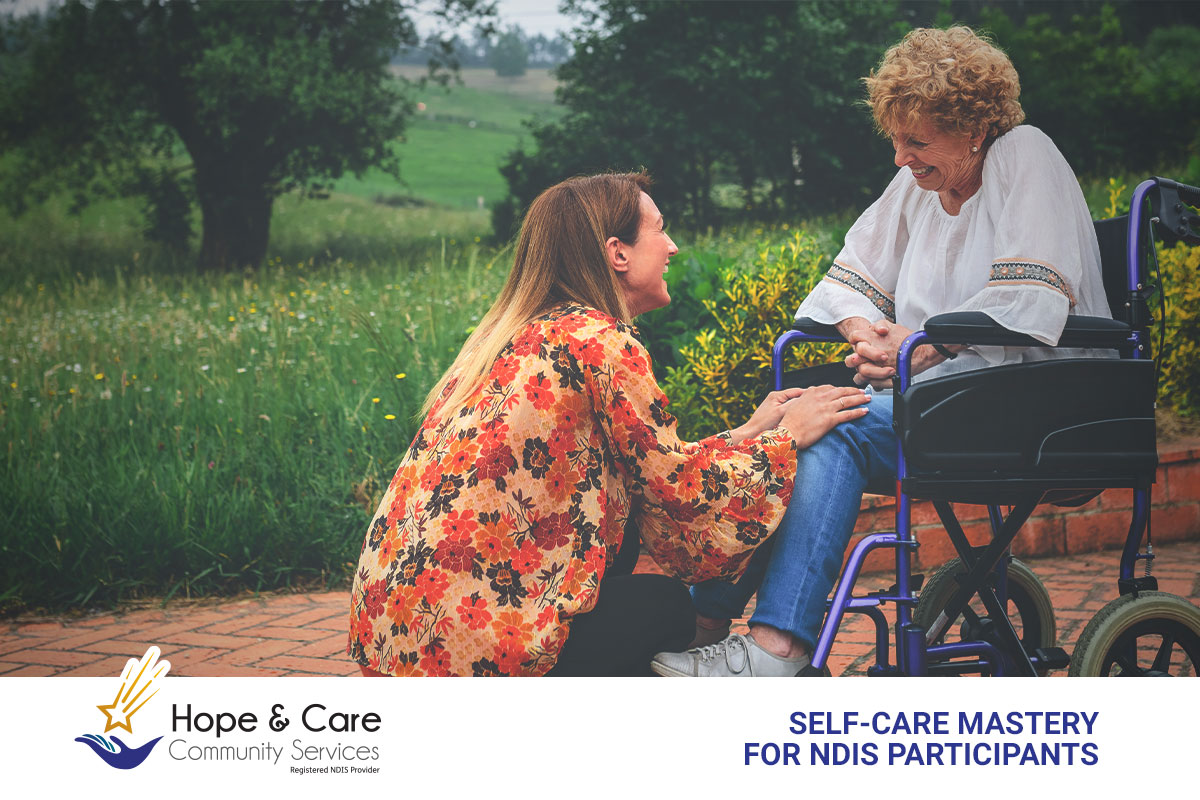
Being an NDIS participant, the art of self-care is not merely beneficial; it’s a fundamental aspect of your overall well-being. Below is a comprehensive guide filled with actionable tips and strategies catering to diverse physical abilities, ensuring that everyone can embark on a journey of self-nurturing.
Staying in Context: Keeping Moods in check and Relaxation Techniques
Life can be challenging and individuals experience different situations at different level and at their own pace. When there is a situation that changes your mood, first thing is to calm down and relax. One doesn’t have to burnout or stay in frustration for long period of time. It starts with helping yourself by actively working on how you tackle the hurdles.
Allocating a few minutes each day for mindfulness and relaxation can remarkably influence your mood and stress levels. Incorporate these techniques into your routine:
- Deep Breaths: Inhale for 4 counts, hold for 7, and exhale for 8. Replicate this calming rhythm.
- Meditate: Find a serene spot, visualize tranquility, and let your mind unwind.
- Muscle Relaxation: Sequentially tense and release muscles, starting from your toes up to your head.
Make these practices a daily ritual, whether it’s before bedtime or during a work break.
Staying Healthy with Exercise and Physical Activity
A well-groomed body flourishes and spreads good vibes around the body. While mental health is important, your physical health is as important as mental health. Active people tend to be more joyous and energised.
Physical activity contributes not only to your body’s health but also to your mental well-being. Tailor these activities to your ability:
- The Physically Able: Run, hit the gym, or cycle.
- Disabled with Wheelchair Usage: Experiment with wheelchair push-ups, seated marching, or indulge in wheelchair basketball.
- For Others with Various Physical Disabilities: Explore seated yoga, resistance band exercises, or indulge in the tranquillity of low-impact swimming.
Remember, if exercise isn’t feasible, focus on other self-care aspects like nutrition and sleep.
Eat, Drink & Sleep with Healthy Habits for Self-care
Fueling your body with nutritious foods enhances your energy levels. With ageing people develop various healthcare needs. One can maintain their body healthy with changes in lifestyle and their food habits.
Consider incorporating these into your diet:
- Eat Fresh Fruits & Veggies: Apples, bananas, carrots, and celery make for nutritious snacks.
- Monitor Protein Intake: Opt for grilled chicken, baked fish, or the versatility of tofu.
- Diversify your Grains: Embrace the wholesomeness of brown rice, whole wheat pasta, and the comforting texture of oatmeal. Different grains have varying nutritional benefits so your bodily needs can be maintained with using different grains to prepare meals.
Cultivate healthier eating habits by cooking at home, packing lunches, and hydrating with water or soothing herbal tea.
Sleep Is Important
Quality sleep is foundational for physical and emotional well-being. A fresh mind after healthy sleep motivates individuals to take on daily life challenges. A good sleep would only make your body & mind happy. So, Cultivate good sleep hygiene with these practices:
- Consider Sleep-friendly Environment: Keep your room dark, quiet, and cool.
- Be consistent with Bedtime Routine: Wind down with reading, calming music, or a luxurious warm bath.
- Recover whenever required after Sleepless Nights: Establish a consistent sleep schedule and steer clear of screens and caffeine before bedtime.
Self-care Conclusion
Taking care of yourself isn’t just a luxury; it’s a necessity for a happier and healthier life. Whether it’s mindfulness, exercise, nutrition, or sleep, every effort contributes to your well-being. And remember, our Support Coordination is here for you, offering guidance and support along your self-care journey. You’ve got this! 💙
HCCS as Registered NDIS provider!
Finally, As Registered Provider, we understand the intricacies of the NDIS. Unlock the full potential of your funding and provide the guidance you need to reach your goals. Feel free to Contact Us to explore how we can assist you on your journey. For instance, the NDIS is there to make a positive difference in your life, and we’re here to help!.
Wait – Want to learn more? Read other articles :
- Registered vs Unregistered NDIS Provider : What it means for you?
- Assistance with daily life under the NDIS Core Supports
- Recovery Coaches under NDIS : Empowering Recovery
HCCS is a rergistered NDIS provider. Learn more about our services.
♥ We are available in Brisbane! – Our team is just a call away!
